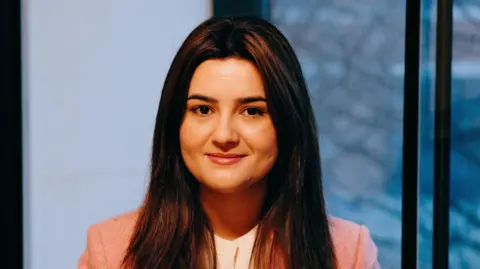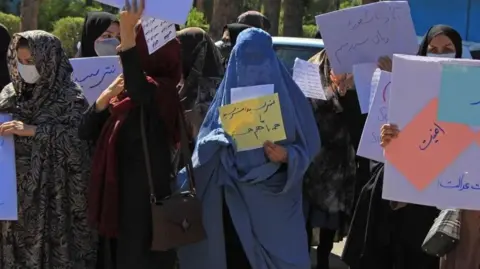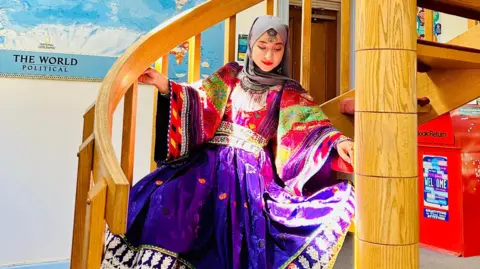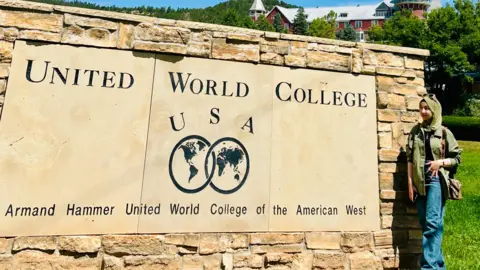 Urdd
UrddFor many people in the UK this week, school has started again.
But for women and girls in Afghanistan, there is still a ban from secondary school classrooms, and much of public life, by the Taliban.
Mah, 22, fled from the country in August 2021 when the group swept into the capital Kabul.
She is now getting an education in the UK, starting a GCSE in English this week and she tells BBC Newsbeat: “I am happy for myself. I am safe. I have freedom. I am free.”
“But at the same time, my friends in Afghanistan can’t do anything,” she adds.
In the three years since the Taliban took control, restrictions on women’s lives have increased.
Women and girls over 12 are banned from schools, and prevented from sitting most university entrance exams. There are also restrictions in the work they can do, with beauty salons being closed, as well as being not being able to go to parks, gyms and sport clubs.
“I don’t put my picture on [Whatsapp or Instagram] stories when I’m happy, when I go out with friends or when I’m in college,” Mah says.
“Because I don’t want my friends [back home] to feel like: ‘Oh she’s in the UK now – she has freedom’.”
Mah, who is in Cardiff, hopes a GCSE in English is the start to eventually becoming a midwife in Wales.
“It’s hard for me because I can go to college here and I can go to work.
“But at the same time, back home, my friends who are the same age, can’t leave the house.”
The Taliban has said its ban is down to religious issues.
They have repeatedly promised women would be readmitted once the issues were sorted – including making sure the curriculum was “Islamic”.
But, there has since been no movement on the ban, and Afghanistan is the only country with such restrictions.
 Urdd
UrddMah’s journey to education in Cardiff was far from easy.
During the Taliban takeover, she says she fled from Helmand Province to Kandahar and then to Kabul. She woke up in the middle of the night, three days after arriving in the capital city, to find the Taliban on her street.
“If I stayed in Afghanistan, maybe they would kill me, maybe they would marry me.
“I called my mum and said ‘Mum, I’m going.’ She said, ‘where are you going?’
“I said, ‘I don’t know’.”
Mah eventually arrived in the UK, along with other refugees who were being welcomed into the country.
“We came without anything. I didn’t say [a proper] goodbye to my mum. I didn’t even hug her. I will never forget this.
“It’s not safe now, but Afghanistan is the place I grew up and, went to school. I can’t forget the country, and I miss everything about it.”
 Getty Images
Getty ImagesMah received support from one of the largest youth organisations, the Urdd, who were providing help in the Welsh capital.
Its chief executive, Sian Lewis, says some people who fled to Wales and received an education are bilingual in Welsh now.
“They were educated here in the Urdd to start off with and a number went to live in different parts of Wales.
“It’s opened so many doors for them,” she says.
When Mah came to the UK, she wasn’t able to speak English.
“It was so hard. I didn’t know anybody. Everything was new.”
But three years on, Mah has spoken to BBC Newsbeat in an English interview which lasted over 20 minutes, and is also learning Welsh.
“People here should say ‘thank God’ everyday.
“Women have rights. People here have whatever they want open to them, and they are safe. They should be happy. They are so lucky.”
 Aqdas
AqdasAnother person who has left Afghanistan is 17-year-old Aqdas.
She’s now in the US with a fully funded scholarship to a college in New Mexico, more than 12,000 miles away from her home.
She recalls the day the Taliban took Kabul.
“I remember that I did not know what to do any more.
“Will they take my rights away? Will I experience violence just like my mother did 20 years ago?
“I noticed that my mum was crying and she placed her hand on my shoulder, telling me that, she couldn’t continue her education because of the Taliban.”
But she told Aqdas that she shouldn’t “let the Taliban or your limitations write the scripts for your life”.
After that, Aqdas continued education online, in secret, with the help of the Herat online school.
“I never gave up on my studying. Whether it was online or finding another way to continue.”
 Aqdas
AqdasIt was a long, and often chaotic, journey for her as well. When she got her scholarship to the USA, she had to get a visa but the embassy was shut in Afghanistan.
She says she then went to Pakistan with her father, using a medical visa because as a female, she did not have permission to leave the country.
Aqdas has now started classes but says there are other things that are often overlooked in Afghanistan.
“Lots of people think the only problem in Afghanistan is just the girls’ education. There are other issues like mental health.
“Girls in Afghanistan are going through depression and anxiety every day and there is no help.”
The UK Government has told BBC Newsbeat that it strongly condemns the ban on women heading to the classroom and university, and that it urgently calls on the Taliban to “reverse these decisions and to protect Afghan girls’ rights”.
Newsbeat has approached the Taliban to comment on concerns that women and girls are banned from education – but have received nothing back.

Read More: The women who escaped Afghanistan to get an education


